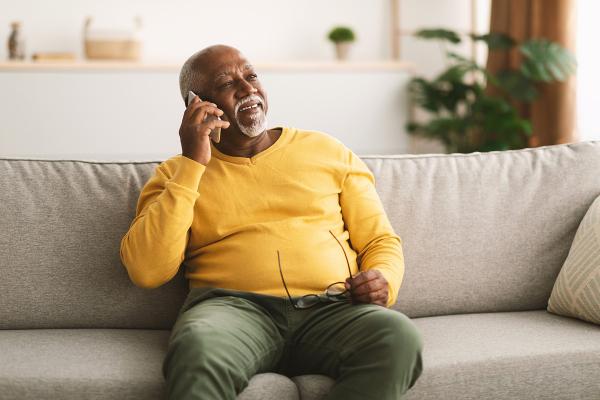
It may be time to get your hearing checked. AARP Hearing Solutions makes it simple. Find a provider today.
Test your knowledge of these devices, from sleeping in your hearing aids to the best ways to charge them. Then find out the answers.

A hearing aid helps you hear your loved ones’ voices, take part in social events, watch your favorite shows and much, much more. But wearing a pair may come with a learning curve. It’s natural to have questions about these devices.
Of course, the main place to get answers is from your hearing care professional. But maybe you haven’t gotten a pair of hearing aids yet. Or you recently started wearing them and are still learning about these devices.
Test your hearing aid know-how with this quiz. Wherever you are in your hearing journey, you may pick up a few handy facts.
Answer: A
Most hearing aids use rechargeable batteries. They come in a case with a charger or a USB port so you can charge them overnight.1 Rechargeable batteries typically keep their charge between 15 and 30 hours, depending on how you use them.2
Rechargeable hearing aids are also more convenient. There’s no need to replace the batteries. They’ll last as long as your hearing aids do.2
Some hearing aids use disposable button batteries. Those will last between 3 and 10 days.1 How long they last depend on the style of hearing aid, its features (such as Bluetooth technology) and how often you use it, says Amanda Langham, Au.D. She’s an audiologist and the owner of Central Texas Hearing Center in Austin. If you hear a low-battery alert like a “de-de-de” melody, this is the sign to change your disposable battery, she adds.

It may be time to get your hearing checked. AARP Hearing Solutions makes it simple. Find a provider today.
Answer: False
There are a few reasons to take out your hearing aids before hitting the hay. For one, you don’t want to lose them in your bed, since they could fall out while you’re sleeping.
There’s also the issue of battery drain. Leaving them in your ears means that they are on, which uses up battery life. So, if you have a rechargeable pair, charging them overnight is the best approach. That way, you don’t have to interrupt your daytime activities.
Answer: A and B
Many hearing aids today use Bluetooth to connect wirelessly to an app on your phone. With a smartphone app, you can program and control your hearing aids to adjust speech and noise levels. Your hearing care professional may show you how to do this after you’ve picked out a pair of hearing aids.
In addition, some hearing aids also have an app that allows for remote adjustments, if you have a hearing aid professional who provides this service. If so, they may be able to adjust your hearing aid from their office while you’re at home.
Bottom line: If you’re struggling to make these changes on your own, head into their office. They’re happy to help. And depending on your hearing benefits plan, you may have no-cost follow-up visits.
Answer: True
There are some circumstances where just a single hearing aid is needed. But most of the time, people wear them in both ears. Hearing loss from aging or noise exposure usually occurs in both ears, according to the National Institute on Aging.3
What’s more, wearing 2 hearing aids sends a more natural signal to the brain that helps you locate the source of sounds more accurately. That helps you hear more clearly.4
Answer: A
“We recommend annual visits,” says Dr. Langham. Just like a prescription for glasses can change over time, so can your ability to hear, even with hearing aids. Getting a hearing exam regularly lets your hearing care professional know that these devices are still right for you. They may also make any adjustments needed.
Of course, once a year is the minimum. If there is an issue with your hearing or your devices, you may want to see your hearing care professional sooner.5
Answer: False
Sometimes it might be an issue with the hearing aid. But there can be other reasons that you hear feedback or static.
For example, the feedback or static you hear may be caused by earwax that builds up inside the ear. When there’s too much earwax, it can block the sound from traveling through as needed.3 Other times there may be an issue with the fit or how well the hearing aid works.3
The solution to feedback is to visit or call your hearing care professional. They can troubleshoot and offer solutions. They can also clean out any earwax, if you aren’t able to do it at home. Or help with the fit or function.
Ready to request a hearing exam and consultation? AARP Hearing Solutions has a national network of hearing care professionals. Request an appointment.
Answer: C
The more hours you wear your hearing aids while you’re awake, the better.5 That means wearing your hearing aids at home, even if you think you don’t need to.
The reason? You need to train your brain to hear again — especially background noises, such as the hum of appliances or the clicks of keyboard keys. Otherwise, your ears and brain will be overwhelmed when you pop them in to go out to work or a social event.5, 6
Sources
Information is for educational purposes only and is not a substitute for the advice of a licensed medical provider. Consult your provider prior to making changes to your lifestyle or health care routine.
AARP Hearing Solutions is available to all AARP members and does not require a health insurance plan from UnitedHealthcare. The AARP hearing program discount cannot be combined with any other discounts, promotions, coupons or hearing aid benefit plans unless noted herein. Products or services that are reimbursable by federal programs including Medicare and Medicaid are not available on a discounted or complimentary basis. AARP commercial member benefits are provided by third parties, not by AARP or its affiliates. Providers pay a royalty fee to AARP for the use of its intellectual property. These fees are used for the general purposes of AARP. Some provider offers are subject to change and may have restrictions. Please contact the provider directly for details. UnitedHealthcare Hearing is provided through UnitedHealthcare, offered to existing members of certain products underwritten or provided by UnitedHealthcare Insurance Company or its affiliates to provide specific hearing aid discounts. This is not an insurance nor managed care product, and fees or charges for services in excess of those defined in program materials are the member's responsibility. UnitedHealthcare does not endorse nor guarantee hearing aid products/services available through the hearing program. This program may not be available in all states or for all group sizes. Components subject to change.
Network size varies by market.